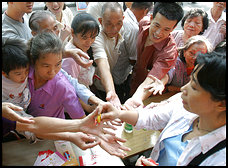|
Hospitals find profit in AIDS, undermine Chinese government's initiatives
By Peter S. Goodman (Washington Post)
Updated: 2005-11-09 10:34
On the day she arrived at the Number Three People's Hospital to seek treatment for HIV, Cai had no symptoms. But she did have a little bit of money, and that gets quick attention in the modern-day Chinese health care system: The doctors pressured her to check in and begin a regimen of expensive intravenous drugs, warning that the alternative was a swift death, she said.

Chinese residents get free condoms provided by local health departments on October 28, 2005 in Guangdong Province, China. Educational campaigns were held by authorities to promote the use of condoms and mark the sixth Male Health Day, established by the National Population and Family Planning Commission of China. [China Photos - Getty Images] |
When she asked for the free anti-AIDS drugs the central government has begun providing to the poor, the doctors rebuffed her, she said, until she agreed to pay for costly tests.
And when she ran through her money and all she could borrow -- her 45-day hospital stay exceeding $1,400, nearly triple her annual income -- the doctors cast her out.
"The director told me to go away and wait until I had some money," Cai said.
China has unleashed a well-financed campaign to stem an epidemic that afflicts 840,000 people. But these efforts are being undermined by a relentless drive for profit within local health care system.
Doctors at local hospitals responsible for dispensing free pharmaceuticals are exploiting those in need, padding bills with unneeded drugs and dubious services, according to medical experts, government officials and patients.
"In China today, if you don't have money, you don't dare go to the hospital," said Odilon Couzin, director of China AIDS Info, a Hong Kong-based advocacy group. "People are suffering unnecessary hospitalizations, unnecessary testing and huge medical bills. The free AIDS treatment program is being used to create profits."
The troubles vexing China's anti-AIDS efforts reflect a broader crisis assailing the health care system. Within the 1950s China eradicated some diseases and dramatically increased life expectancy, employing state-funded hospitals and "barefoot doctors" -- practitioners with basic training who ran rural clinics. But in the 1980s, as China began privatizing large swaths of the economy, the old system was dismantled.
From 1980 to 2004, the central government's share of total funding for health care dropped from 36 percent to 17 percent, according to a recent state study. Doctors and hospitals became responsible for living off their profit.
The state continued regulating fees for basic services, but hospitals were freed to collect profit on sales of new drugs and high-technology tests.
That decision is now widely viewed as a evil. Pharmacies have become profit centers for Chinese hospitals, the source of up to 90 percent of revenue, encouraging doctors to overprescribe drugs, Chinese experts said.
More than half of all Chinese health care spending is devoted to pharmaceuticals, as compared with about 15 percent in most of the developed world, according to a recent World Bank study.
"The hospitals have had to increase their fees and boost drug sales to compensate for the loss of state support," said Cai Renhua, a former Ministry of Health official.
Fewer than one-third of the Chinese have health insurance. From 1980 to 2004, out-of-pocket expenses tripled as a proportion of total health care spending, climbing from 20 percent to 60 percent, according to a recent Ministry of Finance study.
As costs skyrocket, many poor Chinese peasants are relying on folk remedies. Infant mortality is on the rise in some rural areas. And infectious diseases such as schistosomiasis, a chronically debilitating ailment caused by parasitic worms, are regaining traction.
In July, a report released by the Beijing-based Development and Research Center, an institute that is part of China's governing State Council, concluded that the reform of the country's health care system has been "unsuccessful."
|